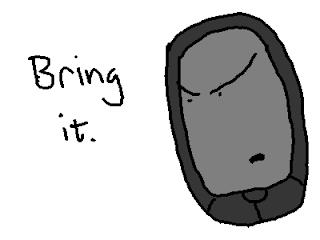One of my chief frustrations as a biology major on South Campus is my commute up North every day for the majority of my classes. Northwestern has one big building, Tech, where almost every single science class is held.
As a biology major, I will have at least 2 classes in Tech every quarter. Tech is up North, 0.7 miles from my dorm. In a world where 15 minutes walking is 15 potential minutes sleeping, my only option is to bike back and forth to Tech several times a day.
This worked out fine fall quarter. I found a fellow on Craigslist who was leaving Evanston and needed to pass on his top quality bike, which was sure to be in good condition, for the small price of $100, since all he had to do was recoup part of the expense of a steed that had served him well for many years.
Such was my anticipation coming into the transaction.
When I arrived after taking the L into downtown Evanston, I found myself a little disappointed. First of all, the bike-owner was late for our negotiated meeting – and not just five minutes late. Like 20 minutes late, and I was idling around in downtown Evanston trying not to look like a victim as the sun started to set.
Eventually he arrived, pulling up to me on the noble steed and exemplifying its excellent brakes with the screech of rubber on sidewalk. After his dutiful apologies for tardiness, I gave the thing a quick inspection and was treated to my second disappointment.
Simply put, it was a shoddy old bike. The brakes, as he had displayed, did work fine – or rather, the brake. The front brake was missing. And upon a closer look, the rear brake pad was so worn down it was almost to the metal underneath.
The rest of the bike was simply old and tired looking. The chain needed oil, the paint was chipped off, and the rubber on the wheels looked like it had been originally used on tank treads in World War II.
But I had taken the L all the way to downtown Evanston, and at the time I was still relatively new to America and didn’t know how much $100 was. I resolved to buy some oil to fix the thing up and make do with it, because clearly beneath its faded exterior, this was a top-notch vehicle worth far more than $100 and it would serve me ruggedly but faithfully for many years to come.
Ha.
As I said before, this worked out fine fall quarter. I oiled the chain and it ran fine. The brake, while worn down, still worked. And the pedals had no issues.
Issues with pedals. That’s almost the last thing that comes to mind when thinking about bike issues. This just exemplifies the nature of my bike’s awfulness.
Anyways, this arrangement worked fine for a while. American weather is sweet during fall and it was no problem that my bike could only be stored on bike racks outdoors.
Then all the sudden fall quarter came rushing to a close and it got cold and there was snow. I shrugged off the first few inconsequential snows. My bike was a paragon of rugged efficiency, perfectly weatherproof.
And then it was time to go home for winter break, and the school opened up a couple storage rooms somewhere to stow your bikes while the wicked winter raged. There were, to my best approximation, two notification emails about these storage rooms.
The first came on the Monday three weeks before school ended, warning that the bikes needed to be stored by Thursday or else they would be left to the elements. I still needed my bike to get to class for the next few days, so I resolved to store my bike on Thursday afternoon.
The second email came on Wednesday, notifying all residents that the storage rooms were full. If you had been slow, that was a terrible dose of bad luck.
That was a terrible dose of bad luck.
I was starting to feel less confident now. I was still sure my bike could weather the winter fine, but it was three weeks without my loving caress, and I just didn’t know what would happen.
Still, break came, I went home and forgot about my bike, and then break was over and we were back.
The first day back, I went and dug my bike out of the three foot drift it was buried in. It was not doing so hot.
After oiling it with half a can of WD-40, the wheels could finally turn again. Some bolt work allowed the kickstand to move, and with some difficulty I could even change gears. But my poor little rear brake would never be the same.
It vacillated between two extremes – permanently hugging the wheel and impeding my progress, or giving up altogether and leaving me to wreck unsuspecting pedestrians.
And on top of the flaws in the bike, my careless WD-40 usage began to stain the insides of the legs of all of my jeans a deep, rich grease-black.
My $100 bike was starting to look hopeless. But that wasn’t the end of the story. Residents of the Chicago area might recall the Winter of ’11, affectionately referred to as the Snowpocalypse – the third worst blizzard in Chicago’s history. It just so happened that this was that winter.
The Snowpocalypse.
The second consecutive day that I had to dig my bike out of the bike rack, I knew that things were too far gone. There was just too much moisture in contact with the bike’s metal – revealed as it was by the peeling paint.
My rear brake never worked right again. I lost access to half of my gears. I could barely move the bike seat, and my pedals… Oh, my pedals.
I furiously oiled everything day after day, wiping away the gobs of rust that came off with the oil, but there are some things that WD-40 can’t fix. And squeaky pedals are one of those things.
It started with a lurching rattling, like the pedals weren’t fixed into the frame but were simply balanced across the shaft and wiggling horribly with every push. And then the squeaking began, shrill as a banshee, and louder.
Every push on the pedal would elicit this shrill screech – my only consolation that its pitch was so high, it was almost untraceable unless someone looked at my feet and happened to notice the eerie, ethereal noise appearing with the same pattern as I pedaled.
I became good at coasting when people were present.
I fought my bike’s faults all of winter quarter and then into spring. When the snows left, I took the bike home and my dad tweaked things and staved off the flaws for a time. But the relief was only temporary, and Illinois’ rainiest April in 50 years soon had my bike back to its beautiful, screeching symphony and paralyzing absence of brakes.
So if you see me wobbling through campus on a misaligned bike seat, bumping into pedestrians and fruitlessly grabbing my brake, and you hear a strange, haunting warble – just know that these things are not related.
So if you see me wobbling through campus on a misaligned bike seat, bumping into pedestrians and fruitlessly grabbing my brake, and you hear a strange, haunting warble – just know that these things are not related.













































